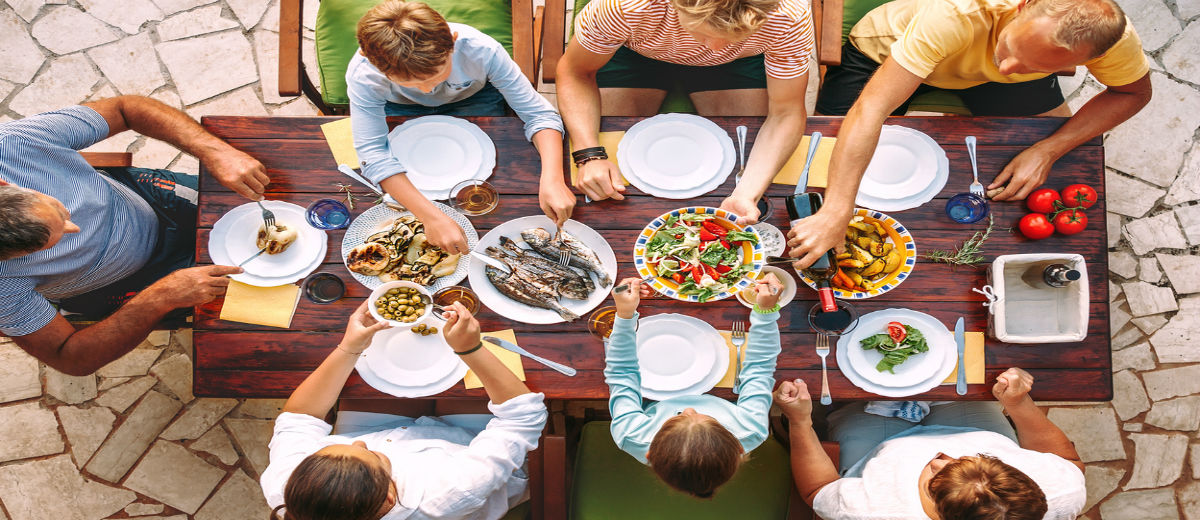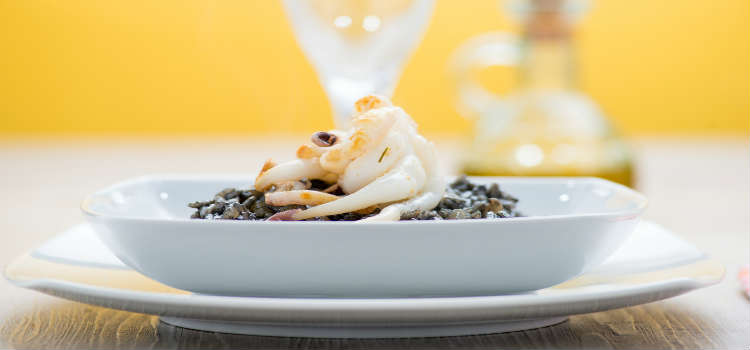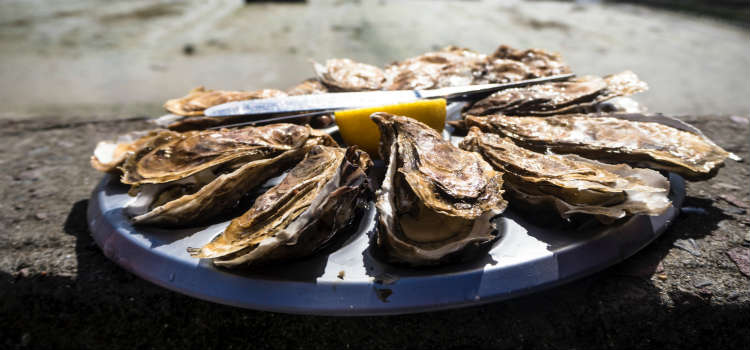

Dubrovnik food combines a rich fusion of flavours and makes it an exciting place to stay for any self-confessed foodies. Traditional dishes draw on a mix of influences such as Bosnian, Montenegrin and Italian, thanks to the city’s location and history. And it’s not just the food scene that’s thriving: a strong winemaking culture on the Pelješac peninsula is responsible for some of Croatia’s finest red wines. From squid ink risotto to Dingač, here are some classic Dalmatian dishes and drinks – and the best places to try them.


Unsurprisingly, due to its coastal location, Dalmatia goes big on seafood. Fish is caught from the waters of the Adriatic, and served that day in local restaurants. Feast on the catch of the day at the historic Proto, a Dubrovnik landmark since 1886 – King Edward VIII and Wallis Simpson are said to have dined here in 1936.
One of the most famous Dalmatian seafood dishes is crni rižot, or squid ink risotto; tuck into a bowl at Orhan, a waterfront restaurant by Fort Lovrijenac. Another speciality is mušule na buzaru, mussels cooked in white wine, garlic, parsley and breadcrumbs. Lokanda Peskarija, located along the city walls, may have a limited menu but it serves a spectacular pot of mussels (its octopus salad is also incredible).


Oysters plucked straight from the seabed of Mali Ston Bay are another must. Mali Ston is a tiny village on the Pelješac peninsula, an hour’s drive from Dubrovnik. It’s said that the molluscs were consumed in honour of Aphrodite, the goddess of beauty, and today they remain a favoured Dubrovnik food.
Traditional Peka stew
For a break from seafood, try Croatian classics like kopun (castrated cockerel in honey and wild orange) or pašticada (wine-stewed beef with gnocchi) at Kopun. This traditional Croatian restaurant also serves a great makaruli šporki, or ‘dirty macaroni’ – macaroni smothered in a rich meat and tomato sauce, similar to ragù or Bolognese.
If you want to try traditional Dubrovnik food, look out for zelena menestra, or green stew. The simple, filling dish traces back to the Konavle region, and the staple ingredients are meat, potatoes and cabbage. You could call this stew a classic: it’s been documented in writings since 1480. Head to the family-run Poklisar for a hearty bowl. The traditional Peka Stew was also recommended by Vesna Rodin, who we carried out a Q&A with to develop our authentic local guide to Dubrovnik.
SO.MUCH.TRUFFLE.CHEESE
Local cheeses and meats appear on the menu of most Dubrovnik restaurants. A couple of the best places for sharing plates include La Bodega at the end of Stradun (don’t miss the truffled cheese and smoked ham) and the harbour-front Gligora, which serves the family’s own award-winning cheese produced on the island of Pag.
Olive oil is the elixir of Mediterranean life. Sprawling olive groves blanket the slopes of Croatia, and the produce is used in everything from olive oil to traditional Dubrovnik food. To try some of this liquid gold, head to Uje on the Stradun, a tiny shop that specialises in Croatian olive oil. The friendly owners have their own groves on the island of Brač; ask to taste the different varieties before making your choice. Nearby, Dubrovačka Kuća also sells local oil among Croatian wines, preserves and jams.
Dubrovnik is ideal for anyone with a sweet tooth. With origins in nearby Ston, Stonska torta is made from makaruli (macaroni), walnuts and chocolate. If you’re not going to be near the Pelješac peninsula, try a slice at Gianni’s, near the Maritime Museum; it’s freshly made by owner Đani van Bloemen, former pastry chef at Michelin-starred 360°.
You haven’t truly tried Dubrovnik food until you’ve sampled rožata, a custard pudding drizzled in caramel and laced with homemade rose liqueur (made using a secret ingredient.) The best place for this sweet treat is Gverović Orsan, a sea-view spot seven kilometres west of the city.
For something to take home with you, pick up some homemade arancini (candied orange or lemon peel) from the local market on Gundulićeva Poljana.
Wine tasting is one of our favourite things to do in Dubrovnik. The nearby Pelješac peninsula produces some of the country’s best red wines from the indigenous Mali Plavac grape. A local favourite is Dingač, grown on sea-facing vineyards near Potomje – nearby winery Matuško is the best place to try it. Other great vintners in the region include Bartulović in Prizdrin and Korta Katarina in Orebić.
Back in the city, D’Vino wine bar is an old town institution, where you can pick from over 100 bottles, or book in for a Dalmatian wine-tasting ‘flight’ (includes either three reds or three whites).
If you ask a local foodie what to do in Dubrovnik, the answer is likely to be: visit the open-air market on Gundulićeva Poljana. Here, you’ll rub shoulders with locals over stalls laden with seasonal goods, such as strawberries, peaches, and olives. For street food, head to Barba where fresh ingredients are thrown together to create tasty on-the-go eats – don’t miss the octopus sandwiches with mascarpone.
The annual April Dubrovnik FestiWine is one for oenophiles. This week-long event sees over 100 local winemakers organise tastings and food-and-wine pairings, in some of the city’s best restaurants. In October, the Good Food Festival is one to watch out for. Globetrotting gourmands will love the mix of culinary workshops and food and wine tastings. There are also special events like dining with a top chef or a gastronomic city tour throughout the three-day event. And you’ll also find special restaurant menus created exclusively for the festival.
Now you’re armed with this handy list of places to try traditional Dubrovnik food, you’ll know exactly where to venture on your Dubrovnik villa holiday! Alternatively, if you’d prefer to try the dishes from the comfort of your own ‘home away from home’ our concierge service can arrange an in-house chef for your entire stay, or just once on a day/night of your choosing, and cook you up a storm!
11 reasons you need to visit Croatia
The four best drives across the Mediterranean Coast
We don't usually associate Britain's southeast shores with beautiful beaches – but if you know… Read More
The Costa Brava is beautiful, brilliant and beguiling all at once, but it's very often forgotten… Read More
Gorgeous beaches and hidden coves, picturesque towns and stunning scenery - Croatia has everything you could possibly… Read More
Tuscany is awash with idyllic charm - everything from the architecture to the landscape is… Read More
With arresting scenery and sparkling Mediterranean coastline, the Spanish region of Costa Brava ticks all… Read More
It's near impossible to imagine France without thinking of the Eiffel Tower sparkling in Paris… Read More